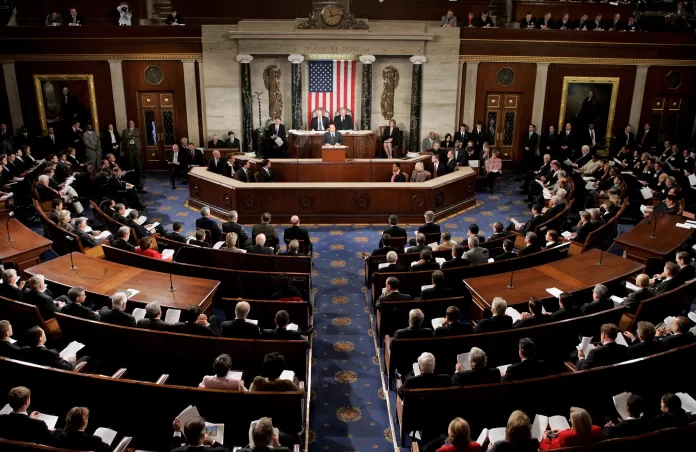The US Senate passed a budget blueprint early Friday that steamrolled past Democratic opposition, moving one step closer to unlocking the funds the Trump administration wants for border security and other priorities.
The slimmed-down framework — which lacks Trump’s support, as it does not include tax cuts he wants to extend — was adopted after an all-night “vote-a-rama” voting session on multiple amendments brought forward by Democrats.
The mostly party-line vote came just before 5 a.m. ET following an all-night “vote-a-rama,” in which senators cast votes on 33 amendments over the course of a 10-hour span. The final vote was 52-48, with Sen. Rand Paul, R-Ky., as the lone Republican to join all 47 Democrats in voting against the budget resolution.
“Without this bill passing,” said Senate Budget Committee Chair Lindsey Graham, R-S.C., “there is no hope of getting money for the border.”
Passage of the Senate plan now puts pressure on the GOP-controlled House, which plans to take up its own competing budget resolution next week. In addition to money for the border, defense and energy, that version also includes a $4.5 trillion tax cut and a $4 trillion debt limit hike.
Trump has endorsed the House version — what he calls “one big, beautiful bill” — but GOP senators have indicated that their version could be a fallback plan if the House blueprint fails.
“To my House colleagues: We will all get there together. If you can pass the one big, beautiful bill that makes the tax cuts permanent — not four or five years — then we’ll all cheer over here. Nothing would please me more than Speaker [Mike] Johnson being able to put together the bill that President Trump wants,” Graham said on the Senate floor Thursday, before voting began.
“I want that to happen, but I cannot sit on the sidelines and not have a plan B.”
Paul, a fiscal hawk, said the budget contradicts GOP rhetoric about reducing spending.
“If we were fiscally conservative, why wouldn’t we take the savings from Elon Musk and DOGE and move it over here and help with the border?” Paul said on the Senate floor before voting began. “Why would we be doing a brand new bill to increase spending by $340 billion?”
Under the process, Senate rules allow for members to propose an unlimited number of amendments.
Democrats sought to force Republicans to take difficult votes through amendments, which the majority party voted down one by one. Many were aimed at protecting benefits and programs they say the GOP is targeting for cuts. One amendment proposed by Senate Minority Leader Chuck Schumer, D-N.Y., would have prohibited the bill from cutting taxes for the wealthy if even $1 is cut from Medicaid, a health care program for low-income Americans.
READ ALSO: Trump’s Plan is to Abolish IRS, and Let Outsiders Pay — US official
It was rejected 49-51, with just two Republicans joining Democrats in favor of it: Sen. Susan Collins, R-Maine, and Josh Hawley, R-Mo.
Just two amendments passed. One of them, offered by Sen. Dan Sullivan, R-Alaska, would create “a deficit-neutral reserve fund relating to protecting Medicare and Medicaid.” But Democrats balked at the proposal, saying it was designed to give political cover to Republicans on the issue and that millions of Americans would lose their coverage.
“The language in this amendment is code for kicking Americans with Medicaid coverage off their health insurance if they’re not sick enough, not poor enough, or not disabled enough,” said Sen. Ron Wyden, D-Ore., who spoke in opposition.
If they fail to reach agreement in the short term, however, they could fall back on the narrower budget framework adopted in the Senate on Friday.
The resolution passed overnight would allow the budget to pass through the Senate with just a simple majority, instead of needing 60 votes. Republicans control the chamber, but with only 53 votes.
Any budget would still need to pass through the House, where Republicans also hold a narrow majority — before becoming law.
Senate Republicans are pushing to pass the slimmed-down budget to help Trump score early political victories on issues such as migration, which has long topped his agenda.
Their version would push other initiatives such as extending his tax credits — which Trump implemented in his first term, and which expire at the end of the year — down the road several months.
Massive federal programs such as Medicare and Medicaid, providing health insurance for millions of Americans, could be targeted by staunch conservatives in the House as they seek to offset the cost of extending Trump’s tax credits.
But slashing those programs could prove wildly unpopular. With only a slim majority in the House, Republicans risk seeing their tax plan rejected.
Trump thanked Senate Republicans in a post on his Truth Social platform Thursday for working to fund his border program.
But he did not backtrack on his earlier comments calling for the larger House budget framework to pass.
“We need both Chambers to pass the House Budget to ‘kickstart’ the Reconciliation process, and move all of our priorities to the concept of, ‘ONE BIG BEAUTIFUL BILL,’” he wrote in a Truth Social post Wednesday.
Senate Republicans have said they will figure out the fine print later in the year and are focused now on urgently funding Mr. Trump’s enforcement operations at the southern border.
“President Trump’s actions are working — they are working so well that the Trump administration says it is running out of money for deportations,” said Senator John Barrasso of Wyoming, the No. 2 Republican. “Senate Republicans will act quickly to get the administration the resources they requested and need.”
But their strategy is also a tacit acknowledgment of the treacherous path their party’s tax and spending package faces in the House. Senate leaders chose to plow ahead with their budget plan even after Mr. Trump endorsed the House’s one-big-bill approach on Wednesday, characterizing their measure as a fail-safe should the House falter.
“If the House can produce one big, beautiful bill, we’re prepared to work with them to get that across the finish line,” Senator John Thune of South Dakota, the majority leader, said at a news conference on Wednesday. “But we believe that the president also likes optionality.”
The House’s budget plan lays out in greater detail where Republicans plan to find spending cuts. For example, the plan instructs the Energy and Commerce Committee, which oversees Medicaid, to come up with at least $880 billion in cuts — more than half of the reductions laid out in the budget outline.
But even that plan does not lay out exactly which federal programs they will cut — or by how much. Lawmakers are required to do so only after the House and Senate adopt their budget resolutions and write legislation detailing specific policy changes to meet the targets they have set.
Even without those details, some Republicans are already feeling antsy about the spending cuts they may be asked to approve.
A group of House Republicans in the Congressional Hispanic Caucus warned in a letter to GOP leaders that their party needed to “ensure that assistance programs” like food stamps “remain protected as nearly 22 percent of Hispanic families rely on this critical program as a temporary safety net during difficult times.”
“I don’t like the idea of massive Medicaid cuts,” Senator Josh Hawley of Missouri told HuffPost. “We should have no Medicare cuts of any kind.”


